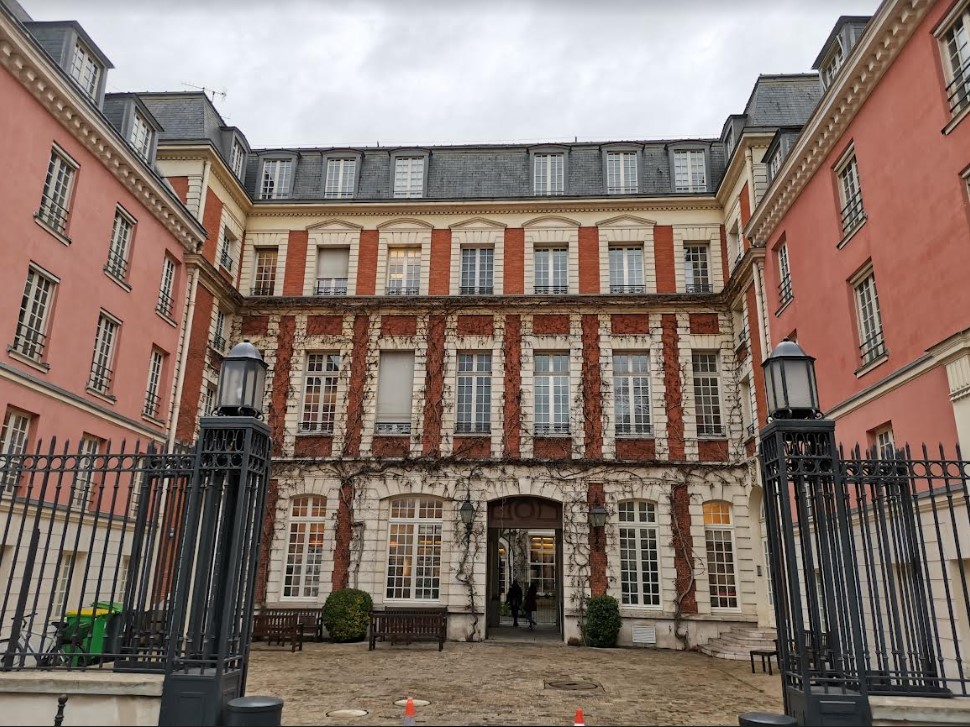The Hôtel Duret de Chevry: A Witness to the History of the German Historical Institute in Paris
 The German Historical Institute (IHA), also known as the Deutsches Historisches Institut Paris (DHIP), is an international research center specializing in history. The institute is headquartered in the Hôtel Duret de Chevry, located in the Marais district at 8 Rue du Parc Royal, 75003 Paris.
The German Historical Institute (IHA), also known as the Deutsches Historisches Institut Paris (DHIP), is an international research center specializing in history. The institute is headquartered in the Hôtel Duret de Chevry, located in the Marais district at 8 Rue du Parc Royal, 75003 Paris.Foundation of IHA
The history of IHA dates back to the early 20th century, when Paul Fridolin Kehr, a renowned medievalist and future president of the Monumenta Germaniae Historica, had already envisaged the creation of a German historical institute in Paris in 1902. However, his initiative came to nothing at the time. It wasn't until 1941 that the idea was taken up by another German medievalist, Theodor Mayer. Mayer hoped that this institute in Paris would strengthen Germany's claim to be the dominant historical player in Europe.
Unfortunately, due to the turmoil of the Second World War, the project was delayed. However, at the end of the war, a new vision emerged, centered on Franco-German reconciliation. This led to the opening of the “German Center for Historical Research” (Deutsche Historische Forschungsstelle in Paris - DHFS) on November 21, 1958. The institute was funded by the German federal government and placed under the direction of the Mainz-based “Scientific Research Commission on the History of Franco-German Relations”. Eugen Ewig, a medievalist, played a key role as the institute's founder at the time.
In 1964, a year after the signing of the Élysée Treaty, the institute was institutionalized on a permanent basis, becoming the German Historical Institute, under the supervision of the Federal Minister for Scientific Research. Alois Wachtel was the institute's first director at this time.
The Hôtel Duret de Chevry
IHA's history is closely linked to the Hôtel Duret de Chevry. Shortly before Horst Möller, future director of the Institut für Zeitgeschichte (Institute for Contemporary History) in Munich, took up his post, the Federal Republic of Germany acquired this private mansion not far from the Place des Vosges. The mansion was built around 1620 by Charles Duret-de-Chevry, a high-ranking royal official.
The official inauguration of the Institute's new location at the Hôtel Duret de Chevry took place on May 19, 1994, in the presence of the President of the Federal Republic of Germany, Richard von Weizsäcker. At the time, IHA was directed by Werner Paravicini, whose research focused on late medieval Burgundy.
Since then, the Hôtel Duret de Chevry has become IHA's emblematic headquarters, symbolizing the institute's ongoing commitment to Franco-German historical research and cooperation.
Evolution of IHA
In 2002, IHA came under the aegis of the Max Weber Foundation, a non-profit organization that groups together several German humanities institutes abroad. Since then, IHA has broadened its geographical horizons and strengthened its commitment to the digital humanities, with digitization and open access research projects.
Under the direction of Thomas Maissen since 2013, IHA has also expanded its research areas, notably by launching projects on sub-Saharan Africa in partnership with African universities. In 2015, a research project on the bureaucratization of African societies was initiated, marking an important turning point in the institute's research.
IHA's missions
IHA has three main missions: research, mediation and qualification.
Research
IHA conducts research projects in cooperation with French partners, and welcomes researchers from all over the world for research into the history of Western Europe and Africa. Research themes cover a vast period from the Middle Ages to the 21st century. The institute has also invested in digital humanities, enabling important sources to be digitized and made available in databases.
Mediation
IHA regularly publishes its research in a variety of formats, and organizes international colloquia, seminars and conferences to promote cooperation between historians from France, Germany and around the world.
Qualification
The institute offers support programs for young researchers, including summer universities, thematic excursions, specialized language courses and paleography workshops. It also offers mobility and residency grants to students, as well as scientific internships.
Organization and research projects
IHA comprises five departments: Middle Ages, Modern History, Contemporary History, Digital Humanities and Africa. It employs around 40 people and is supported by a scientific advisory board comprising nine French and German professors from all historical periods.
Library
IHA's library is an important resource for researchers. It offers free access to a collection of 120,000 volumes and 350 current periodicals on French and German history, as well as on the history of relations between the two countries. The library is also a partner of the German interlibrary loan service.
Publications
IHA regularly publishes the results of its research, including doctoral and habilitation theses. The institute has an open access strategy, allowing online access to all publications. The journal Francia, the Pariser Historische Studien, the collection Histoire franco-allemande and other publications are examples of IHA's contribution to historical research.
In conclusion, the Hôtel Duret de Chevry, which houses the German Historical Institute in Paris, is an emblematic place that has played a central role in promoting research into Franco-German and European history. IHA continues to engage in innovative research projects, promote mediation and support the qualification of young researchers, while offering free access to a large proportion of its publications, thus contributing to the enrichment of international historical knowledge.